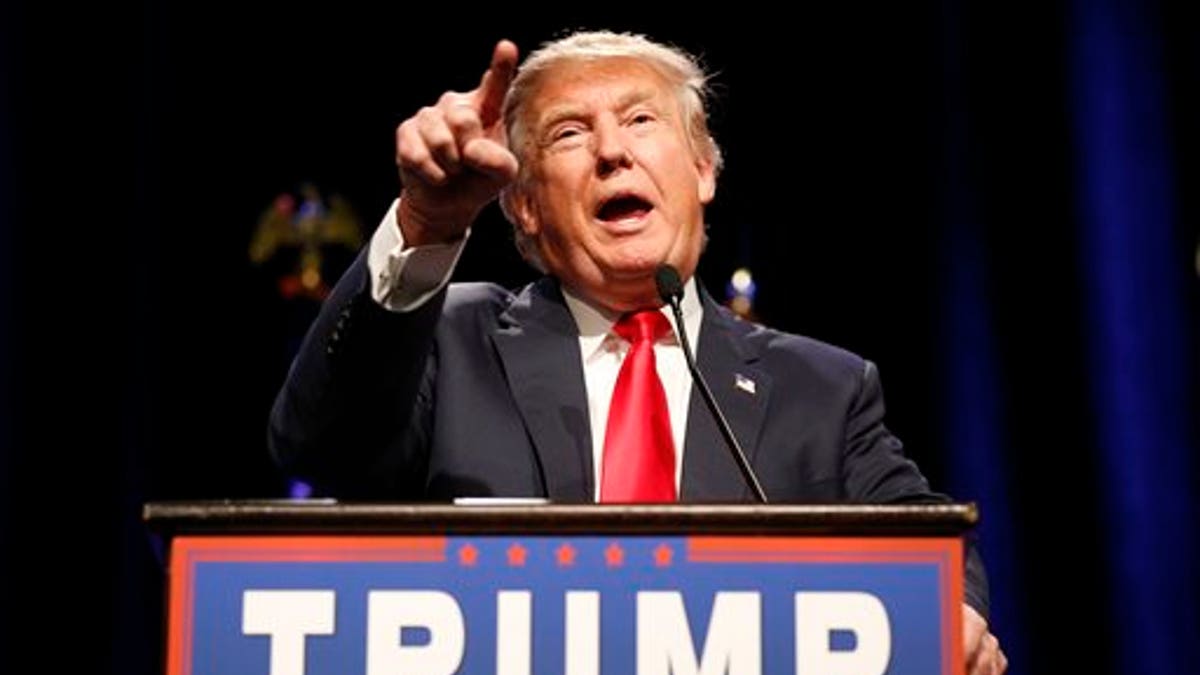
Republican presidential candidate Donald Trump speaks at a rally Monday, Dec. 14, 2015, in Las Vegas. (AP Photo/John Locher)
Tech experts have poured scorn on Donald Trump’s controversial idea of “closing” parts of the Internet in an attempt to tackle the Islamic State terror group.
Trump surprised his rivals during Tuesday's Republican debate when he suggested clamping down on Internet connectivity as a way to limit ISIS’ ability to recruit and raise funds online.
Experts, however, say that shutting swaths of the Internet would be extremely difficult to do and warn that the effects on innocent civilians in the affected regions would be devastating.
Related: Anonymous declares 'war' on ISIS, vows cyberattacks
“It was a bit like listening to a plumber talk about performing brain surgery because he had read a couple of articles about it,” Charles King, principal analyst of the Hayward, Calif.-based tech research firm Pund-IT, told FoxNews.com. Trump’s unrealistic plan, he explained, would mean destroying extensive communications infrastructure across a certain area. Even then, satellite communications would still be available to people, King added.
“Shutting off Internet connectivity to entire regions of people is difficult, if not impossible,” added Cornell Technology Prof. Thomas Ristenpart, in a statement emailed to FoxNews.com. “It would require the cooperation of local Internet Service Providers and even that is an unlikely scenario.”
Ristenpart, a member of the Cornell Tech Security Group, added that even if shutting off Internet connectivity were possible, it would be a terrible idea. “Preventing entire populations from getting access to basic information would be a human-rights catastrophe, particularly for areas of the world that are already war-torn,” he said.
Related: Sony's PlayStation 4 could be terrorists' communication tool, experts warn
“Trump is just babbling,” Roger Kay, president of tech research firm Endpoint Technologies, told FoxNews.com, via email. The Internet, he explained, is made of up of millions of servers that pass messages through each other. “It's a bit like the Post Office, where letters come in with addresses from and to all over,” he added. “Some of them are delivered locally, and some are passed on to the next server closer to the final address or the one with the least traffic at that moment or the first one it can get a hold of.”
Kay explained that if one pathway is knocked out, then all the Internet Protocol messages, or ‘packets’ route around the break. “Internet protocol was designed to be highly robust and decentralized,” he said. “There are a few big ‘trunks,’ huge fiber-optic cables that run undersea and carry much of the traffic from, say, the U.S. to Japan, but there are multiples of most of those and other routes, like satellite, even if they all go out.”
The Internet has proved an effective tool for ISIS, sparking debate about the best way to reduce the jihadists’ digital presence. Last month, following the deadly Paris terror attacks, hackers from the activist group Anonymous declared “war” on ISIS and claim to have disrupted more than 11,000 alleged ISIS-related Twitter accounts as part of their #OpParis strategy.
Related: Secure messaging app Telegram removes 78 ISIS-related channels
Speaking during Tuesday’s Republican debate, Trump said that America should harness the expertise of Silicon Valley in the digital battle against ISIS. "I don't want them using our Internet and taking our young impressionable youth," he said. "These are not masterminds. We should be using our brilliant minds to figure out ways ISIS cannot use the Internet and then we should be able to penetrate the Internet and find out exactly where ISIS is."
The GOP front-runner had already discussed his Internet idea during a rally in South Carolina last week, explaining his desire to draw on the expertise of tech heavyweights such as Bill Gates.
During Tuesday’s debate Ohio Gov. John Kasich slammed Trump’s idea, adding that the focus should be on law enforcement’s ability to tackle terrorists’ encryption. Kentucky Sen. Rand Paul also voiced his concern over whether Trump's Internet idea is constitutional.
Some experts, though, say there may be some legal backing for Trump’s plan.
FoxNews.com’s Chris Snyder contributed to this report.
Follow James Rogers on Twitter @jamesjrogers
